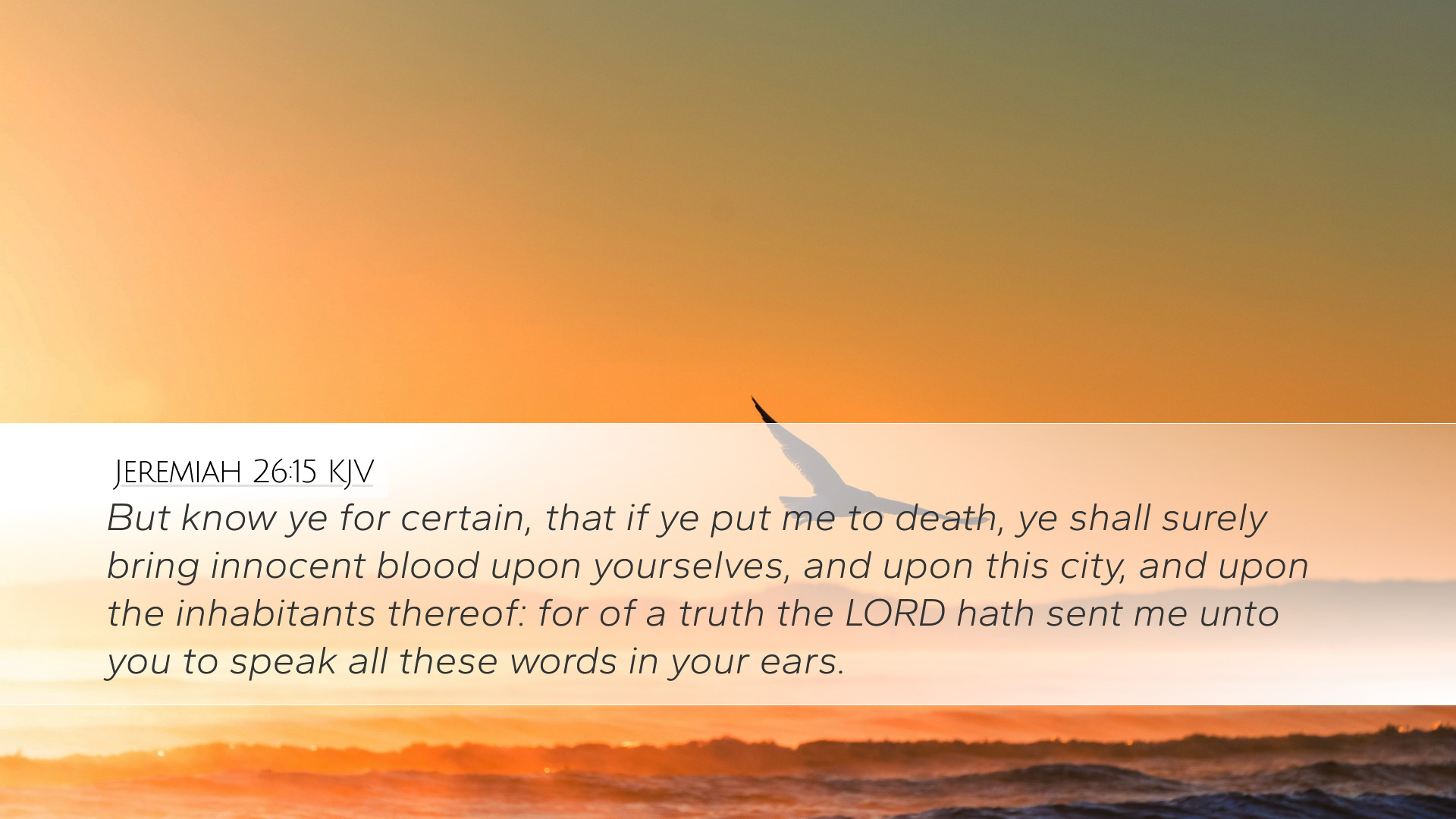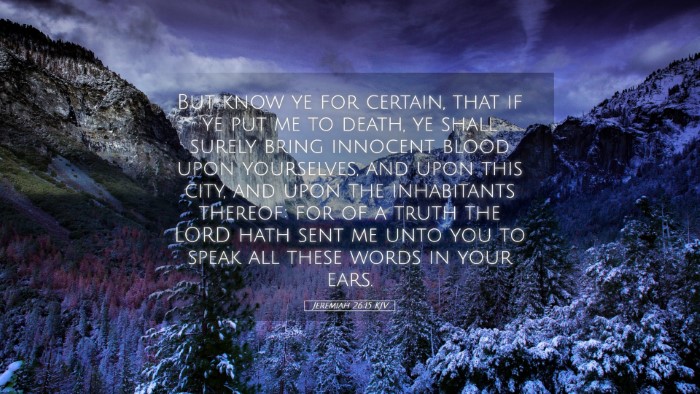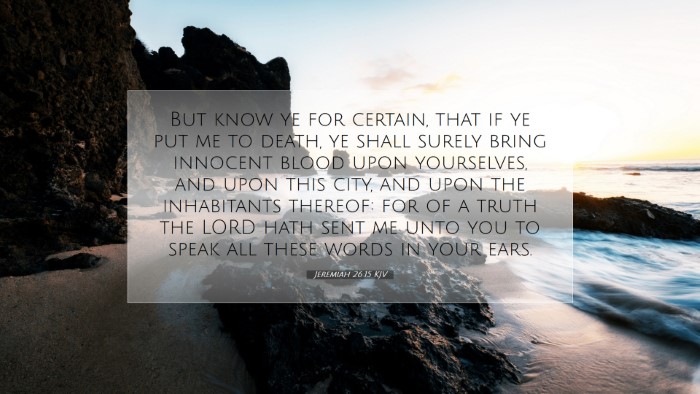Commentary on Jeremiah 26:15
Bible Verse: "But know for certain that if you put me to death, you will surely bring innocent blood on yourselves and on this city and on its inhabitants, for in truth the LORD has sent me to you to speak all these words in your hearing." (Jeremiah 26:15)
Context and Background
The Book of Jeremiah offers extensive insights into the prophetic tradition of Israel's history, particularly during times of crisis. In chapter 26, Jeremiah is confronted for publicly delivering God's word of warning against Jerusalem and Judah. This particular verse encapsulates the weight of prophetic responsibility and the dire consequences of rejecting God's messages through His prophets.
Historically, Jeremiah's prophecies emerged during a period marked by idolatry, moral decay, and impending judgment. He stands as both messenger and martyr, emphasizing the profound struggles faced by those who faithfully proclaim divine truth amidst opposition.
Insights from Matthew Henry
Matthew Henry highlights the gravity of the prophet's declaration in this verse. He emphasizes that Jeremiah is asserting that, should his life be taken unjustly, the consequences would be devastating. The "innocent blood" refers to Jeremiah himself, but it also extends to the collective guilt of the citizens of Jerusalem who would be complicit in silencing God's voice.
Henry points out the serious implications of rejecting God's messengers. Those who act against prophetic calls must recognize that their actions lead to greater judgment falling upon them and the community. The phrase "body and blood" serves as a clarion call to all who have ears to hear God's warnings and to act righteously.
Insights from Albert Barnes
Albert Barnes takes a theological approach to the implications of this verse. He stresses the notion of "innocent blood"—a term he connects to the deeply rooted concept of justice within biblical theology. Barnes elucidates that when the people of Jerusalem turn against the prophet of God, they not only harm the messenger but also bring calamity upon themselves due to their rebellion against divine authority.
He argues that Jeremiah's words reveal God's mercy even in impending judgment. By sending the prophet, God provides an opportunity for repentance. Therefore, the rejection of this chance by killing the prophet would indeed multiply the guilt and suffering of the people. Barnes invites readers to heed the prophetic voice, stressing the theme of divine justice interwoven throughout the biblical narrative.
Insights from Adam Clarke
Adam Clarke's commentary emphasizes the rhetorical structure of Jeremiah's defense. He points out that Jeremiah is not merely issuing a warning but is also laying out the moral and spiritual truth of the situation. Clarke notes that the prophet provides a clear recognition of the grave ramifications that await those who spill his blood.
Clarke also reflects upon the broader implications of rejection of the divine message; it is an act that is seen not just in terms of immediate consequences, but also in terms of historical rebellion. He encourages scholars and theologians to examine the underlying messages of God's mercy contrasted with human disobedience, illustrating that prophetic figures often stand as both witnesses and advocates, appealing for repentance before the onset of disaster.
Theological Reflections
This verse encapsulates critical theological themes, including the nature of prophecy, divine justice, and human accountability. It serves as a poignant reminder that rejecting God's call leads to severe repercussions not only for individuals but for communities at large. This underscores the prophetic tradition's emphasis on communal sin and corporate responsibility.
Furthermore, it challenges readers to contemplate their own response to prophetic warnings within their contexts, urging them to cultivate a posture of openness towards divine truth, rather than resistance.
Practical Applications
For pastors and spiritual leaders, Jeremiah 26:15 serves as a reminder that delivering God's messages may attract resistance and hostility. Effective ministry involves courageously speaking truth, regardless of potential fallout. In times when societal pressures challenge biblical standards, church leaders must embody the prophetic spirit demonstrated by Jeremiah—boldness rooted in a deep understanding of God's justice and mercy.
Additionally, for students and theologians, this verse invites rigorous examination of the narrative of God's engagement with humanity. It raises critical discussions about the role of prophets and the implications of their messages in contemporary contexts. Understanding how the weight of prophetic responsibility extends to modern settings can enrich one’s theological education and practical ministry.
Conclusion
Jeremiah 26:15 encapsulates a profound warning about the consequences of disregarding prophetic voices. The combined insights from Matthew Henry, Albert Barnes, and Adam Clarke illuminate the depths of this verse, offering theological and practical applications for the church today. It is a poignant reminder of the urgency to listen, repent, and align ourselves with God's will before calamity befalls us.


